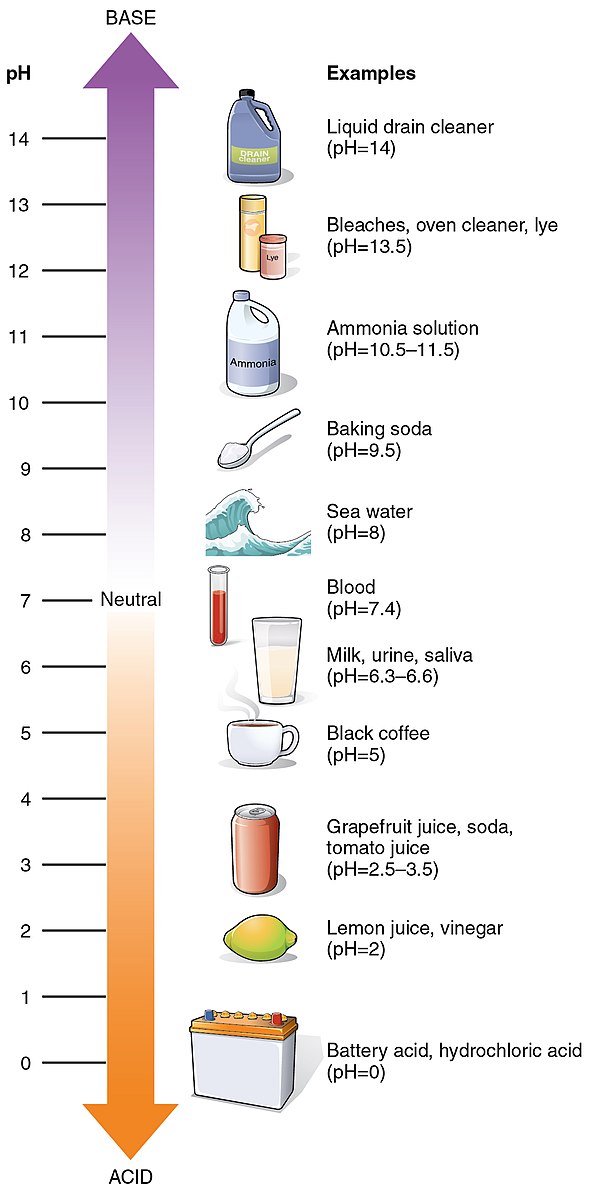The pH of benzoic acid in water is a crucial factor to consider, especially for those who want to use it for DIY projects or home remedies. Benzoic acid is a weak organic acid with a pKa value of approximately 4.2, and understanding its pH behavior is essential for various applications.
Understanding the pH of Benzoic Acid in Water
Benzoic acid dissociates in water to form hydrogen ions (H+) and benzoate ions (B-). The pH of the solution is determined by the concentration of hydrogen ions, which can be calculated using the acid dissociation constant (Ka) of benzoic acid.
The formula for calculating the pH of a weak acid, such as benzoic acid, is:
pH = -log([H+])
Where [H+] is the concentration of hydrogen ions in the solution.
To find the concentration of hydrogen ions, you can use the following equation:
Ka = [H+][B-]/[HB]
Where [HB] is the concentration of benzoic acid, [B-] is the concentration of benzoate ions, and [H+] is the concentration of hydrogen ions.
Calculating the pH of Benzoic Acid Solutions
 Image source: OpenStax College
Image source: OpenStax College
Let’s consider a few examples to illustrate the calculation of the pH of benzoic acid in water.
Example 1: 0.1M Benzoic Acid Solution
For a 0.1M solution of benzoic acid, the pH can be calculated as follows:
Ka = 6.3 x 10^-5 M
[HB] = 0.1 M
[H+] = [B-] (since the dissociation is 1:1)
Substituting the values, we get:
6.3 x 10^-5 = [H+]^2/0.1
[H+] = 0.0025 M
Using the pH formula:
pH = -log(0.0025) = 2.61
Therefore, the pH of a 0.1M solution of benzoic acid is 2.61.
Example 2: 0.20M Benzoic Acid Solution
For a 0.20M solution of benzoic acid, the pH can be calculated as follows:
Ka = 6.3 x 10^-5 M
[HB] = 0.20 M
[H+] = [B-] (since the dissociation is 1:1)
Substituting the values, we get:
6.3 x 10^-5 = [H+]^2/0.20
[H+] = 0.0056 M
Using the pH formula:
pH = -log(0.0056) = 2.44
Therefore, the pH of a 0.20M solution of benzoic acid is 2.44.
Factors Affecting the pH of Benzoic Acid Solutions
The pH of benzoic acid solutions can be influenced by several factors, including:
- Concentration of benzoic acid: As the concentration of benzoic acid increases, the pH of the solution decreases.
- Presence of contaminants or other substances: Contaminants or other substances in the solution can react with benzoic acid, affecting the pH.
- Temperature: The pH of benzoic acid solutions can be slightly affected by changes in temperature.
Maintaining the Desired pH Range
When working with benzoic acid solutions, it is essential to maintain the pH within the desired range for the specific application. This may involve adjusting the pH by adding a base or an acid, or using various purification methods to remove contaminants that could affect the pH.
Conclusion
The pH of benzoic acid in water is an essential factor to consider for various applications, including DIY projects and home remedies. By understanding the principles of weak acid dissociation and the factors that influence the pH, you can effectively calculate and manage the pH of benzoic acid solutions to ensure optimal performance and safety.
References:
- Avesh Chemistry. (2024, February 25). pH of an aqueous solution containing 1M benzoic acid. [Video]. YouTube. https://www.youtube.com/watch?v=LetAZZ8Cz1g
- Vaia. (n.d.). Calculate the pH of a 0.20 M solution of benzoic acid at 25°C. Retrieved from https://www.vaia.com/en-us/textbooks/chemistry/principles-of-modern-chemistry-8th-edition/acid-base-equilibria/p-29-problem-a-calculate-the-ph-of-a-020-m-solution-of-benzo/
- MyTutor. (n.d.). Calculate the pH of 0.1M Benzoic Acid (C6H5COOH). Ka = 6.3×10-5 M. Retrieved from https://www.mytutor.co.uk/answers/51393/A-Level/Chemistry/Calculate-the-p-H-of-0-1-M-Benzoic-Acid-C6-H5-COOH-Ka-6-3×10-5-M/
- ThoughtCo. (2019, August 11). How to Calculate the pH of a Weak Acid – ThoughtCo. Retrieved from https://www.thoughtco.com/calculating-ph-of-a-weak-acid-problem-609589.
